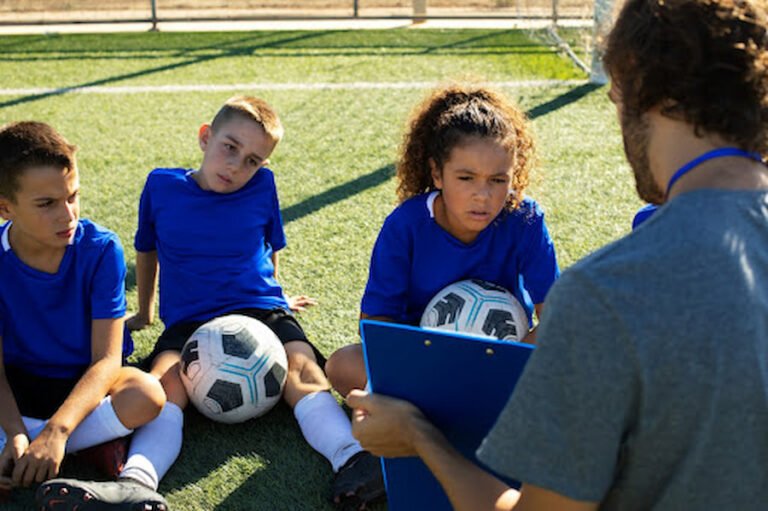Introduction
Sports have long been honored for their entertainment value as well as for their major contribution to human growth. Beyond only physical ability and competitive drive, sports are quite helpful in developing important life qualities including leadership skills and collaboration. This article investigates the several ways in which engaging in sports could improve these fundamental skills.
Building Teamwork and Leadership Skills
Teamwork: The Foundation of Sports
Sports are by nature team events. Whether it’s a synchronized swimming group, a relay race, or a soccer team, the capacity of its members to cooperate harmonically determines the team’s performance. Key components of good cooperation are efficient communication, sharing of tasks, and supporting one another—all of which athletes acquire by continuous practice and competition. This background fits quite nicely in many spheres of life, including personal relationships and the business. Purchase Arsenal Vs Man City tickets from reliable sources and stay away from ticket agents.
Communication Skills: The Cornerstone of Effective Teamwork
In sports, where split-second choices and tactics can determine the fate of a game, good communication is very vital. Athletes have to collaborate with teammates, offer and receive comments, and continually transmit data. This exercise improves nonverbal as well as vocal communication abilities, therefore promoting accuracy and clarity in concept expression. Athletes take with them skills beyond the field of play that enable them to clearly express ideas and actively listen under duress.
Trust and Dependability: Building Team Cohesion
In sports, a basic element of collaboration is trust. Executing plays and tactics depends on team members depending on one another, hence dependability and high degree of trust are very necessary. Regular practice, mutual respect, and common goals help one to build this trust. Athletes grow in dependability and responsibility as they rely on one another to fulfill their tasks, therefore strengthening team performance and cohesiveness.
Conflict Resolution: Navigating Challenges Together
Any team environment will always involve conflicts; sports are no different. Arguments about roles, performance, or tactics might surface and call for teams to gently settle problems. Athletes learn to negotiate, compromise, and find common ground in the special setting that sports present. Any group environment may benefit from these conflict-resolving techniques, which help people to control differences and cooperate toward solutions.
Leadership: Emerging from the Game
In sports, leadership goes beyond official positions like team captains. Any member that shows initiative, motivates others, and shows dedication will develop leadership skills. Sports provide people lots of chances to show leadership—by inspiring teammates, making calculated judgments, or setting an example. This experience helps sportsmen create a leadership approach fit for many situations.
Decision-Making: The Essence of Leadership
Throughout games, athletes must make difficult decisions including selecting the appropriate tactic or making fast tactical corrections. These choices call for a mix of experience, intuition, and analytical thought. Under duress, athletes improve their ability to solve problems and learn to properly balance choices. A fundamental quality of leadership is this capacity for making decisions, which helps people to lead with confidence and understanding in many circumstances.
Motivation and Inspiration: Leading by Example
In sports, good leadership skills often includes encouraging and motivating people. Encouraging endurance, tenacity, and a good attitude, coaches and captains help to define the squad. Leaders who live up to these standards can have a big impact on their subordinates, therefore encouraging a group effort and energy. A great leadership skills that transcends athletics into the personal and professional spheres is this capacity to motivate and raise others.
Accountability: Embracing Responsibility
In sports, responsibility encompasses not just personal performance but also performing one’s part inside the team. A key component of leadership is athletes learning to own their actions—both wins and mistakes. Accepting responsibility motivates people to pursue team and personal excellence as well as to grow from failures, therefore promoting an always improving culture.
Collaboration and Competition: Balancing Team Dynamics
In sports, the interaction of cooperation and rivalry generates a dynamic atmosphere where people have to balance team objectives with personal ambition. Athletes pick up the ability to negotiate this equilibrium as they understand that individual successes help the team to be overall successful. This knowledge helps people to achieve both personally and as part of a team, therefore promoting a cooperative attitude even while preserving healthy competitiveness.
The Transferability of Sports Skills to Other Areas
The abilities acquired in sports—teamwork, leadership, communication, and resilience—are quite applicable to many spheres of life. In the workplace, these abilities boost job performance, strengthen connections, and help one’s career to grow. The knowledge gained on the field or court may be used in several situations, therefore proving the broad influence of sports on both personal and professional growth.
Conclusion
Sports provide a potent means for personal growth rather than only physical training. Through sports, people acquire critical life-changing abilities including leadership skills and teamwork that go well beyond just enjoyment. The lessons learned from sports show the great importance of athletic involvement in promoting development and accomplishment in many different fields, therefore laying a basis for success in those areas.
Visit Theessport for more interesting articles.

